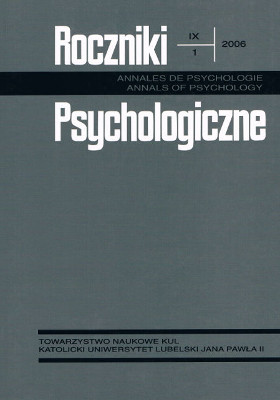Children’s reactions to their father’s internment
Abstract
The tests show what children experienced during the time their fathers were interned under martial law in December 1981. Such children numbered in Poland ca. 20.000. The tests were conducted among 30 mothers who talked about the reactions of 54 children aged 1 to 18. They reported on the changes in their children’s behaviour. What their children said in projective tests was coherent with mothers’ reports. The children, irrespective of their age, yearned after their fathers. At the same time they lived under threat, manifested a heightened level of anxiety and fear. Therefore they wanted to sleep with their mothers and be always close to them. Their fear was associated with numerous psychosomatic symptoms and a fall of general immunity. In younger children there was in most cases a regression in self-service activities, their sleeping patterns were disturbed, they were afraid of darkness, often woke up and screamed, disturbance of mood, grimaces, and weepiness. In older children their anxiety considerably increased, but at the same time there were other changes. Their fear was more concrete (fear of militiamen, fear of necessity of emigration). At the same time they were proud of their fathers, and in many cases sought to take on some roles, took care of their mothers or younger brothers and sisters. Some of the reported patterns of behaviour were similar to those in other situations when children are separated from their fathers, but in total the changes in question constitute a different syndrome.
References
Błaszczak, W. (2004). Rozwój osobowości po doświadczeniu realnego zagrożenia życia. Przegląd Psychologiczny, 47, 1, 61-76.
Braun-Gałkowska, M. (1992). Psychologiczna analiza systemów rodzinnych osób zadowolonych i niezadowolonych z małżeństwa. Lublin: Towarzystwo Naukowe KUL.
Braun-Gałkowska, M. (2001). Być ojcem. W: D. Kornas-Biela (red.), Oblicza ojcostwa (s. 201-210). Lublin: Towarzystwo Naukowe KUL.
Braun-Gałkowska, M. (2002). Metody poznawania systemu rodzinnego. Lublin: KUL.
Braun-Gałkowska, M., Steuden, S. (1987). Projekcja niepokoju w rysunkach dzieci. Zagadnienia Wychowawcze a Zdrowie Psychiczne, 2-3, 85-94.
Corman, L. (1970). Le test du dessin de famille. Paris: Presses Universitaire de France.
Dyczewski, L. (1981). Rodzina polska i kierunki jej przemian. Warszawa: OdiSS.
Giera, J. (1984). Psychologiczna analiza reakcji dzieci na czasowe pozbawienie opieki ojcowskiej. Lublin, mps Archiwum KUL.
Janiszewski, L. (1986). Sukces małżeński w rodzinach marynarzy. Warszawa: PWN.
Juras, R. (1983). Niektóre społeczne skutki stosowania kary pozbawienia wolności. Problemy Rodziny, 6, 11-20.
Kornacka-Skwara, E. (2004). Psychologiczna analiza systemów rodzinnych mężczyzn bezrobotnych. Częstochowa: WSP.
Kozdrowicz, E., Pilch, T. (1984). Rodzina wielkomiejska matki samotnej jako środowisko wychowawcze. W: Z. Tyszka (red.), Rodzina a struktura społeczna (s. 163-172). Bydgoszcz: „Pomorze”.
Lachowski, S. (1988). Problemy ojców samotnie wychowujących dzieci. W: T. Kukołowiecz (red.), Pomoc rodzinie niepełnej (s. 37-44). Sandomierz.
Lachowska, B. (1998). Dzieci osób owdowiałych. Lublin: Redakcja Wydawnictw KUL.
Minuchin, S. (1974). Families and family therapy. Cambridge: Harvard University Press.
Oleś, M., Oleś, P. (2001). Z psychologicznych aspektów ojcostwa. W: D. Kornas-Biela (red.), Oblicza ojcostwa (s. 255-268). Lublin: Towarzystwo Naukowe KUL.
Plopa, M. (2005). Stres w izolacji morskiej. Gdańsk: Wyd. Uniwersytetu Gdańskiego.
Pospiszyl, K. (1980). Ojciec a rozwój dziecka. Warszawa: Wiedza Powszechna.
Radochoński, M. (1987). Choroba a rodzina. Rzeszów: WSP.
Rembowski, J. (1972). Więzi uczuciowe w rodzinie. Warszawa: PWN.
Salem, G. (1987). L’approche therapeutique de la famille. Paris: Masson.
Strelau, J., Zawadzki, B., Oniszczenko, W., Sobolewski, A. (2002). Kwestionariusz PTSD – wersja czynnikowa (PTSD-C): konstrukcja narzędzia do diagnozy głównych wymiarów zespołu stresu pourazowego. Przegląd Psychologiczny, 45, 2, 149-176.
Tyszka, Z. (1984). Społeczne uwarunkowania cech rodziny i procesów życia rodzinnego. W: Z. Tyszka (red.), Rodzina a struktura społeczna (s. 9-14). Bydgoszcz: „Pomorze”.
Copyright (c) 2006 Roczniki Psychologiczne

This work is licensed under a Creative Commons Attribution-NonCommercial-NoDerivatives 4.0 International License.


